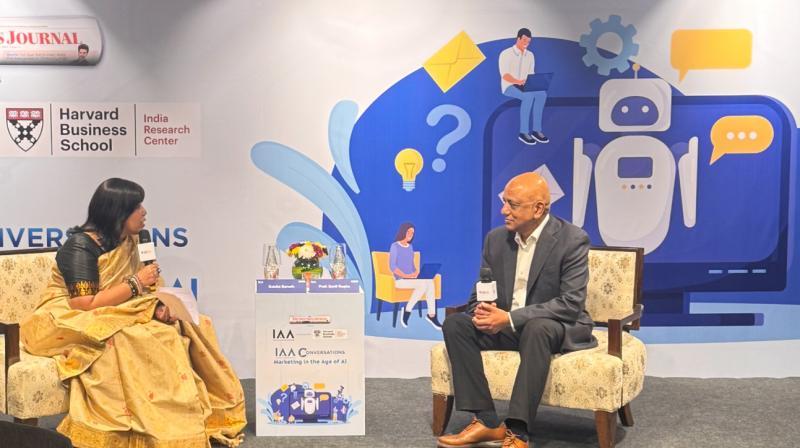At the IAA Conversations, held in Mumbai on 21 January, Sunil Gupta, Edward W Carter professor - business administration and co-chair, executive program- driving digital strategy, Harvard Business School, discussed the transformative impact of technology, implications of AI in the advertising and branding world and his concerns regarding the technology.
Titled, ‘Marketing in the age of AI’, the chat was moderated by Babita Baruah, CEO, VML India, and IAA Mancom member.
The session started by spotlighting AI’s disruptive nature and how it helps create value for industries.
“Almost every business across categories, not just advertising, is thinking about AI and how it will affect their business. Technology will affect us in three different ways. The first is to augment and automate. The other aspect is that companies will focus on figuring out how to use this technology and grow and expand. And the last is to innovate and disrupt. The access and ease of creating content will encourage companies to experiment more,” he said.
“In the advertising world, we will get more creative solutions and the initial ideas could come from AI, which might reduce cost and create efficiency,” he added.
Gupta cited the example of Facebook and Google and explained how such tech giants are leveraging this technology.
“‘The Facebooks’ and ‘the Googles’ of the world are already automating the process wherein one gives the goal, target audience and budget and it will automatically create millions of ads and see which one works better and allocate the money,” he noted.
Consumer behaviour
Gupta divulged, “There is so much data about consumers now. It’s not only what they buy and search for, it’s what they do on social media or why they make a call to the call centre. It’s not easy to put together the qualitative and quantitative data and get a 360-degree view. But with AI it can be done.”
“AI can be a smart research assistant that gathers all the customer data and gives insights. It can even find the customer journey and help discover the friction points. I think everything that we want to do but are finding difficult because of the vast amount of data and in different places, can now be stitched together with AI, if not today, tomorrow,” observed he.
Gupta also mentioned how companies today are creating synthetic consumers, which, in turn, helps with market research at the early stages. "We can create synthetic personas based on the past data that we have and at least initially one can get very quick ideas even before the launch of a product,” he said.
Hindrances with the technology
Gupta also voiced his concerns regarding the technology. He remarked that the use of AI will increase competition because a lot more people will come in as anybody would be able to do it.
On the advertising side of things, he spotlighted, “With AI experimentation and seeing different permutations and combinations, companies will be able to fine-tune the ROI component faster. If one can measure it and do it more accurately, there will be a tendency to put more dollars towards that. The potentially damaging effect that this will have on brands would be that they will get sucked more into the short term rather than building brands. And advertising is all about building brands.”
AI at workplace
Gupta suggested a few shifts required at an organisational level when it comes to the application of AI.
“The first thing that all of us have to do, whether we are an entry-level person or a CEO, is to embrace AI. You can't learn to swim by sitting on the side of the pool or by watching somebody else swim. You have to jump in the pool yourself,” he said.
He advised that one should invest time learning the technology and know its shortcomings.
“Spend a significant amount of time understanding both the good and the bad of it. Because AI can't do everything and we need to understand what it can and can’t do and where the negative parts or the limitations of the technology lie,” said Gupta.
“No technology has reduced our workload. The same was said about computers, mobile phones and social media. It hasn’t happened and it’s not going to happen. We will find other things to do which means that there's no reduction in the workload,” he said when asked if he thinks AI will save our time.
The transformative effect on industries
Recalling his conversation with a chief economist at Google, Gupta pointed out that there was a study done about the impact of technology which revealed that ‘jobs don’t go away, tasks go away.’
“Every job has multiple tasks. Think about all the things that one does and break it into different components. Some tasks which one calls the non-value added components will go away which means you won't spend time on them. We will spend more time on some tasks and less on others. Chances are it will be the non-value added ones that you'll spend less time on,” he asserted.
On a concluding note, Gupta said, “Don't forget one should always start with what is the problem they’re trying to solve. Sometimes, we just get sucked away by technology much more than we should. The other big issue certainly in your business is the copyright and IP. Protect your IP and data. All the tech companies are here to grab your data because that's the only thing that powers the technology.”
The February issue of Manifest features a chat with Gupta. Pre-order the issue at a 20% discount (INR 200) here.











